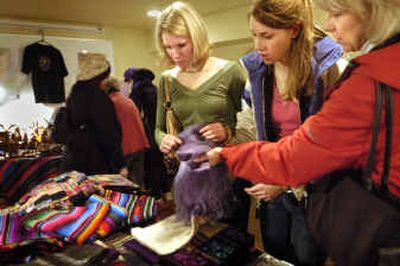Fair trade market makes difference around world

People shopping at a fair trade marketplace Saturday used their gift-buying dollars to support artists living in a half-dozen impoverished countries.
The show, at Global Folk Art Gifts and Imports on Main Street, featured hand-woven creations, jewelry and artwork reflecting a rich array of cultures.
“We didn’t get past the first booth before we were spending money,” said Kat Rice of Spokane. She and her sister, Susan Weeks of Seattle, hope to make the show an annual tradition.
“The concept is good, and the art is good. You’re doing something good but you feel like you’re treating yourself,” Weeks said.
Fair trade is a consumer movement to improve the financial condition of impoverished people by paying them a living wage in return for their goods. Because fair trade companies work directly with individuals and artists’ cooperatives, middlemen are eliminated and the workers receive a higher percentage of profits.
Festival organizers Denise Attwood and her husband, Ric Conner, run Ganesh Himal Trekking and Trading Co., which imports handcrafted items made by Nepalese artists.
Motivated by an appreciation of different cultures and a love of travel, the Spokane couple spent the last 20 years traveling to Nepal and helping artists design products that represent Nepal but are Americanized enough to sell.
“You develop a relationship with the producers, and you help develop products that are going to sell in the Western market,” Connor explains. “We are still slaves to the fickle Western market.”
The successful collaboration is reflected in dresses, shirts and vests made of fabrics that marry two traditional Nepalese arts: hand-weaving and block printing. More than 1,000 women now earn wages weaving and printing fabric, which a Sherpa tailor transforms into stylish clothing. Their creations are distributed to 200 different retailers throughout the world.
Attwood believes that fair trade businesses have gained supporters, particularly over the past five years.
“It’s just neat that people are realizing they can make a difference with their own personal spending,” Attwood said.
Maria Concepcion Gonzales and her husband, Felipe Gonzales, sell textiles, beads and woodcrafts through MoonFlower Enterprises. Their Spokane business supports 35 Guatemalans, many of them women who are sole supporters of their families.
After spending years working for social causes in Guatemala, and watching the financial struggles of the people, the two started their business.
“Part of our philosophy at MoonFlower Enterprises is to educate people about the Mayan culture,” Felipe Gonzales said.
People from four different Guatemalan provinces send the couple beautiful items with woven patterns that convey something unique about their heritage. In return they earn a living wage, which helps keep their history alive.
“Part of the reason we are doing this is to support the grass-roots efforts of Mayan artisans,” Maria Gonzales said.
Marc Hankin and his wife, Patricia Daniel, sell woven items made in Thailand to support an orphanage. The orphanage has a community outreach program that educates young girls about alternatives to prostitution. Prostitution is widespread in poverty-plagued Thailand and many children at the orphanage have lost their mothers to AIDS.
Three times a year, the couple volunteer their time to sell crafts created by a group of Thai women, who donate their talents to raise money for the orphanage, located in a village near Cambodia.
Last year, their collective works garnered about $3,000 in America — the money was returned to better the Thai village, Hankin said.
“$3,000 can help support 10 kids for the year. It’s small stuff here, but it makes a huge impact.”